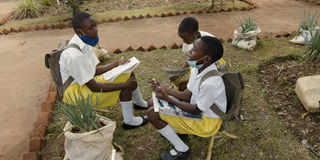Using mobile furniture to keep children in school

Pupils of Gombe Kayunga Primary School use the SeatPack. A SeatPack is a school bag that unfolds into a seat and contains a writing pad. PHOTO/courtesy
What you need to know:
The seatpack is a personal school-bag that turns into a mobile bamboo-chair with a writing surface for a primary school child, creating mobile classroom furniture for the African continent. Mobile classrooms are safe because they allow social distancing while limiting the spread of Covid-19.
The story of Covid-19 which will forever stay etched in our minds has created challenges and opportunities for some businesses.
Although some sectors were re-opened and others remain closed, a number of Standard Operating Procedures must be followed to curb the spread of Coronavirus.
For the education sector, innovations have been made to revolutionise the education system world over.
One such innovation is SeatPack that enables children to stay in school while following the Covid-19 Standard Operating Procedures (SOP).
Mr Leon Mugagga, the chief executive officer, SeatPack, says that the innovative solution was tailored to address challenges faced by children in Ugandan schools such as lack of desks and ensure social distancing amid the Covid-19 pandemic.
“The idea was birthed on resolving the inadequacy of desks in schools, pressures from population growth and increasingly endangered forest cover, the 600 gram school bag unfolds into a seat and contains a writing pad,” Mr Mugagga says.
Eco-friendly
It is environmentally and economically sustainable. A SeatPack is an African bag brand which donates a profit from each urban bag it sells, to making and giving a School-SeatPack.
The personal school-bag turns into a mobile bamboo-chair with a writing surface for a primary school child, creating mobile classroom furniture for the African continent.
“The School-SeatPack is an all-weather school bag that performs as a mobile, personal desk for primary school children whose classrooms have no or insufficient furniture,” Mr Mugagga, a graduate in Environmental Design and Architecture from Uganda Martyrs University says.
Due to under-facilitation, post-conflict or post-disaster situations, the SeatPack is a scalable option that is 90 per cent cheaper to make and distribute than a traditional wooden-classroom-desk.
He adds that mobile classrooms make the safest schools today because they allow social distancing to limit Covid-19 spread.
For such reasons, the SeatPack brand partners with organisations and private companies keen on impacting quality of education across Sub-Saharan Africa, while availing incomes to more than 65 local-artisans along its value chain.
“This personalised mobile furniture meets a key requirement for safer-classrooms during Covid19 containment; flexible, mobile - classrooms that allow social distancing during school hours,” he says.
According to Tutudesk, 2017, the pre-Covid-19, over 95-million African children did not afford traditional-wooden classroom furniture (desks/lockers) while averaging 77 children per classroom without furniture to aid writing and reading.
Mr Mugagga notes that in a post-Covid19 era, meeting space recommendations for safer schools with 77 children per classroom requires an alternative, flexible and cheaper than the $110 wooden locker.
With school closures in Uganda presenting remote learning options such as television and online lessons, the 79 per cent rural primary-students (aged 6 to 12 years according to Uganda Bureau of Statistics) are left with one option to continue studying: School reopening by meeting safer-school requirements.
SeatPack has been developed over nine iterations since 2017 with school-child feedback and mentorship from Mr Felix Okoboi .
He says: “We are determined to efficiently furnish classrooms after 9 iterations and four years learning how to best scale it up and make it happen.”
It started in 2019 with the support of the Total StartUpper of the Year challenge, the solution has since evolved from a cotton-canvas and aluminium chair-based product (Chinese manufactured aluminium) to a sustainable cotton-canvas and bamboo chair-based product that is 100 per cent made in Uganda.
He explains: “Due to inventory loss during Covid-19 of the Chinese based aluminium, the Zetu Africa team quickly designed and tested an alternative material base with bamboo from across the country.”
Why SeatPack amid Covid-19?
Mr Mugagga elucidates that as a result, the unit cost of production per SeatPack adjusted from Shs95,000 to Shs65,000 making it more cost efficient.
The innovation will improve the way 10,000 children study by furnishing classrooms with SeatPacks; personalised, mobile school-furniture that facilitates open, light-weight spaced safer-learning environments meeting pandemic containment standards over the course of 2021.
“It will facilitate post-Covid-19 literacy (reading and writing) for 10 million school children by furnishing 200,000 classrooms with SeatPacks by 2030,” he says.
In addition, it ensures conserving tree cover in the long term (by replacing wood-based furniture with portable, light-weight bamboo seats attached to the school bags).
Challenge
One of the biggest challenges cited is the number of SeatPacks needed by schools.
“Although this is our greatest opportunity to date, we have an overwhelming number of children that require the SeatPack. We are currently tasked with understanding the positive effects of mobile classroom furniture and scaling those positive effects as quickly as we can across the continent,” he says.
To achieve this, they shall need active support from partnerships with local and foreign entities that believe in proper education for all children.
Future plans
SeatPack emerged one of the four innovators who won during the UNICEF Uganda Innovation Fund Challenge that seeks to address challenges focusing on early childhood survival and development; improving access to basic education and adolescent development for girls and boys aged 13 – 19 and ensure that children are free from all forms of violence, abuse, neglect and exploitation.
With each winner receiving Shs77 million, Mugagga’s plans to subsidise 1,000 SeatPacks for school children in rural Uganda within six months, and study these effects to inform our 10,000 school children furnished with SeatPack - target by March 2022.




